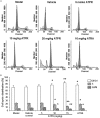A novel all-trans retinoic acid derivative inhibits proliferation and induces differentiation of human gastric carcinoma xenografts via up-regulating retinoic acid receptor β
- PMID: 26175847
- PMCID: PMC4494137
A novel all-trans retinoic acid derivative inhibits proliferation and induces differentiation of human gastric carcinoma xenografts via up-regulating retinoic acid receptor β
Abstract
Objective: This study is to investigate the in vivo effects of 4-amino-2-trifluoromethyl-phenyl retinate (ATPR) on gastric carcinomas (GC).
Methods: Adult male nude mice were subcutaneously injected with SGC-7901 human gastric cancer cells. Tumor cell cycle was analyzed with flow cytometry. The expression levels of cycloxygenase 2 (COX-2) and carcinoembryonic antigen (CEA) in xenograft tumors were detected with immunohistochemistry. The mRNA and protein expression levels of nuclear retinoic acid receptor β (RARβ) were detected with RT-PCR and Western blot analysis, respectively.
Results: The mean survival time was dramatically increased in the ATPR treatment groups, in a dose-dependent manner. The in vivo results showed that, the xenograft tumor growth was significantly inhibited by the ATPR treatment. Moreover, the percentages of cells in the G0/G1 phase were significantly increased, while the percentages of cells in the S phase were significantly decreased, in the ATPR treatment groups. The serum levels of ALP and LDH were both dramatically decreased in the ATPR treatment groups. Furthermore, immunohistochemistry showed that, the expression levels of COX-2 and CEA were dramatically decreased in the ATPR treatment groups. Importantly, the mRNA and protein expression levels of RARβ in xenograft tumors were apparently increased by the ATPR treatment.
Conclusion: ATPR could inhibit proliferation and induce differentiation of human gastric carcinoma xenografts via up-regulating RARβ expression. ATPR might be a potential effective antitumor agent for the treatment of GC.
Keywords: 4-amino-2-trifluoromethyl-phenyl retinate (ATPR); antitumor effect; differentiation induction; gastric carcinoma; retinoic acid receptor β (RARβ).
Figures







Similar articles
-
A novel all-trans retinoic acid derivative 4-amino‑2‑trifluoromethyl-phenyl retinate inhibits the proliferation of human hepatocellular carcinoma HepG2 cells by inducing G0/G1 cell cycle arrest and apoptosis via upregulation of p53 and ASPP1 and downregulation of iASPP.Oncol Rep. 2016 Jul;36(1):333-41. doi: 10.3892/or.2016.4795. Epub 2016 May 9. Oncol Rep. 2016. PMID: 27177208
-
Proteomic analysis of cell cycle arrest and differentiation induction caused by ATPR, a derivative of all-trans retinoic acid, in human gastric cancer SGC-7901 cells.Proteomics Clin Appl. 2017 Jul;11(7-8). doi: 10.1002/prca.201600099. Epub 2017 Mar 6. Proteomics Clin Appl. 2017. PMID: 28164444
-
4-Amino-2-trifluoromethyl-phenyl retinate inhibits the migration of BGC-823 human gastric cancer cells by downregulating the phosphorylation level of MLC II.Oncol Rep. 2014 Oct;32(4):1473-80. doi: 10.3892/or.2014.3343. Epub 2014 Jul 18. Oncol Rep. 2014. PMID: 25051015
-
A novel retinoic acid analog, 4-amino-2-trifluoromethyl-phenyl retinate, inhibits gastric cancer cell growth.Int J Mol Med. 2014 Feb;33(2):415-22. doi: 10.3892/ijmm.2013.1574. Epub 2013 Dec 4. Int J Mol Med. 2014. PMID: 24317440
-
In vivo pharmacokinetics, biodistribution and antitumor effect of amphiphilic poly(L-amino acids) micelles loaded with a novel all-trans retinoic acid derivative.Eur J Pharm Sci. 2014 Jan 23;51:157-64. doi: 10.1016/j.ejps.2013.09.016. Epub 2013 Sep 26. Eur J Pharm Sci. 2014. PMID: 24076464
Cited by
-
Combination treatment of all-trans retinoic acid (ATRA) and γ-secretase inhibitor (DAPT) cause growth inhibition and apoptosis induction in the human gastric cancer cell line.Cytotechnology. 2018 Apr;70(2):865-877. doi: 10.1007/s10616-018-0199-3. Epub 2018 Feb 7. Cytotechnology. 2018. PMID: 29417442 Free PMC article.
-
All-trans retinoic acid inhibits the proliferation of SGC7901 cells by regulating caveolin-1 localization via the ERK/MAPK signaling pathway.Oncol Lett. 2018 Feb;15(2):1523-1528. doi: 10.3892/ol.2017.7499. Epub 2017 Nov 29. Oncol Lett. 2018. PMID: 29434845 Free PMC article.
-
Overexpression of SphK2 contributes to ATRA resistance in colon cancer through rapid degradation of cytoplasmic RXRα by K48/K63-linked polyubiquitination.Oncotarget. 2017 Jun 13;8(24):39605-39617. doi: 10.18632/oncotarget.17174. Oncotarget. 2017. PMID: 28465486 Free PMC article.
-
Efficiency of All-Trans Retinoic Acid on Gastric Cancer: A Narrative Literature Review.Int J Mol Sci. 2018 Oct 29;19(11):3388. doi: 10.3390/ijms19113388. Int J Mol Sci. 2018. PMID: 30380687 Free PMC article. Review.
-
Prevalence of ABCB4 polymorphisms in gallstone disease in han-Chinese population.Am J Transl Res. 2016 Feb 15;8(2):1218-27. eCollection 2016. Am J Transl Res. 2016. PMID: 27158408 Free PMC article.
References
-
- DeSantis C, Naishadham D, Jemal A. Cancer statistics for African Americans, 2013. CA Cancer J Clin. 2013;63:151–166. - PubMed
-
- Qu Y, Dang S, Hou P. Gene methylation in gastric cancer. Clin Chim Acta. 2013;424:53–65. - PubMed
-
- Zhao P, Dai M, Chen W, Li N. Cancer trends in China. Jpn J Clin Oncol. 2010;40:281–285. - PubMed
-
- Xiong B, Ma L, Cheng Y, Zhang C. Clinical effectiveness of neoadjuvant chemotherapy in advanced gastric cancer: an updated meta-analysis of randomized controlled trials. Eur J Surg Oncol. 2014;40:1321–1330. - PubMed
-
- Sachs L. Growth, differentiation and the reversal of malignancy. Sci Am. 1986;254:40–47. - PubMed
LinkOut - more resources
Full Text Sources
Research Materials
Miscellaneous
